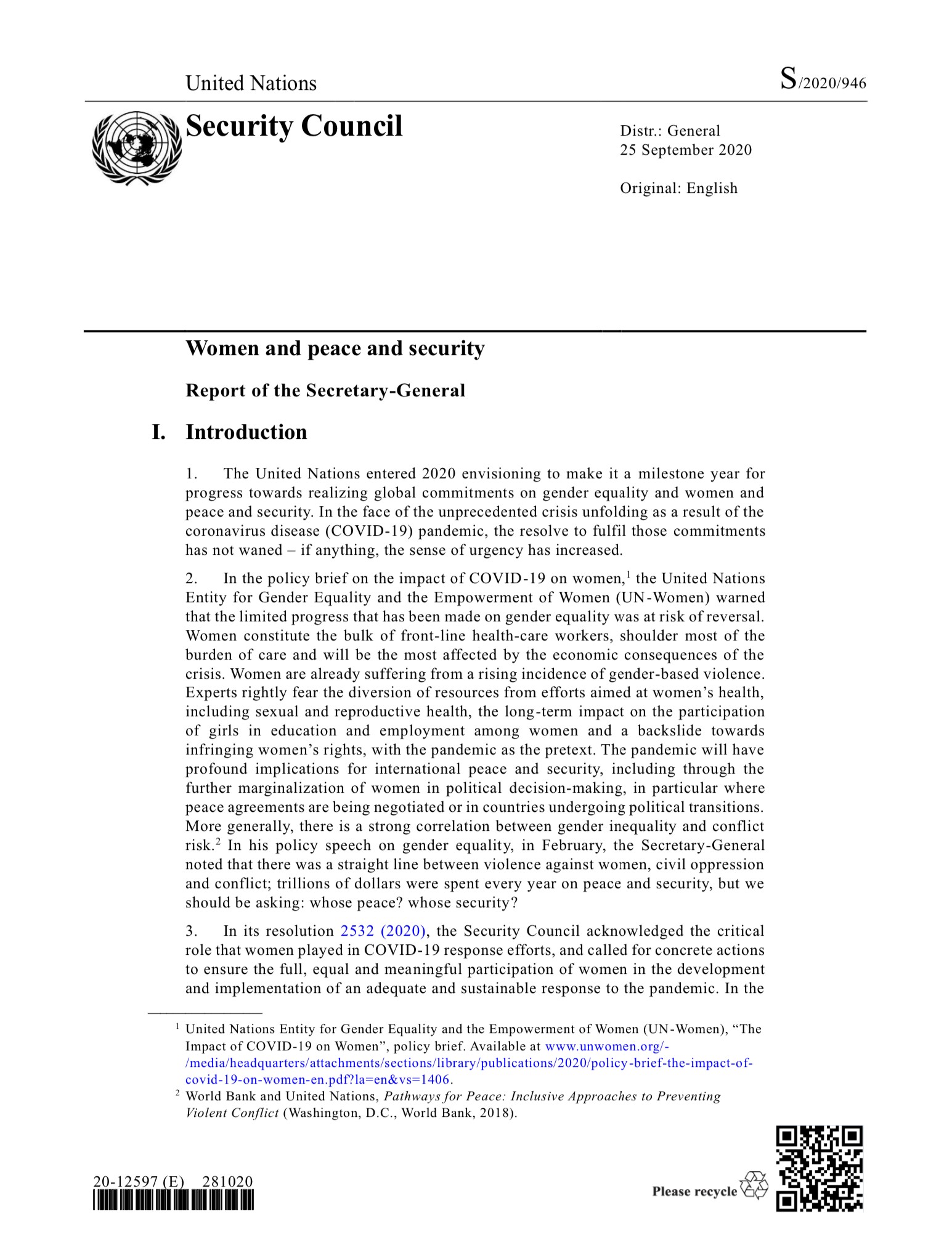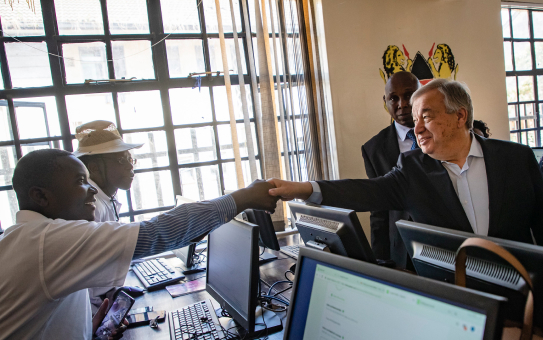 UN Photo: Duncan Moore
UN Photo: Duncan Moore
The good offices and mediation roles of the Secretary-General in the prevention and the peaceful settlement of disputes derive from the Charter and have been developed through extensive practice. These roles can be set in motion at the Secretary-General’s own initiative, in response to a request from one or more of the parties to a dispute, or as a result of a request from the Security Council or the General Assembly.
Article 98 of the Charter provides that the Secretary-General, in addition to acting in that capacity in all meetings of the General Assembly, of the Security Council, of the Economic and Social Council and of the Trusteeship Council, ‘shall perform such other functions as are entrusted to him by these organs’. These often include functions in the field of the prevention and the peaceful settlement of disputes.
Article 99 of the Charter provides that the Secretary-General may 'bring to the attention of the Security Council any matter that in his opinion may threaten international peace and security'.
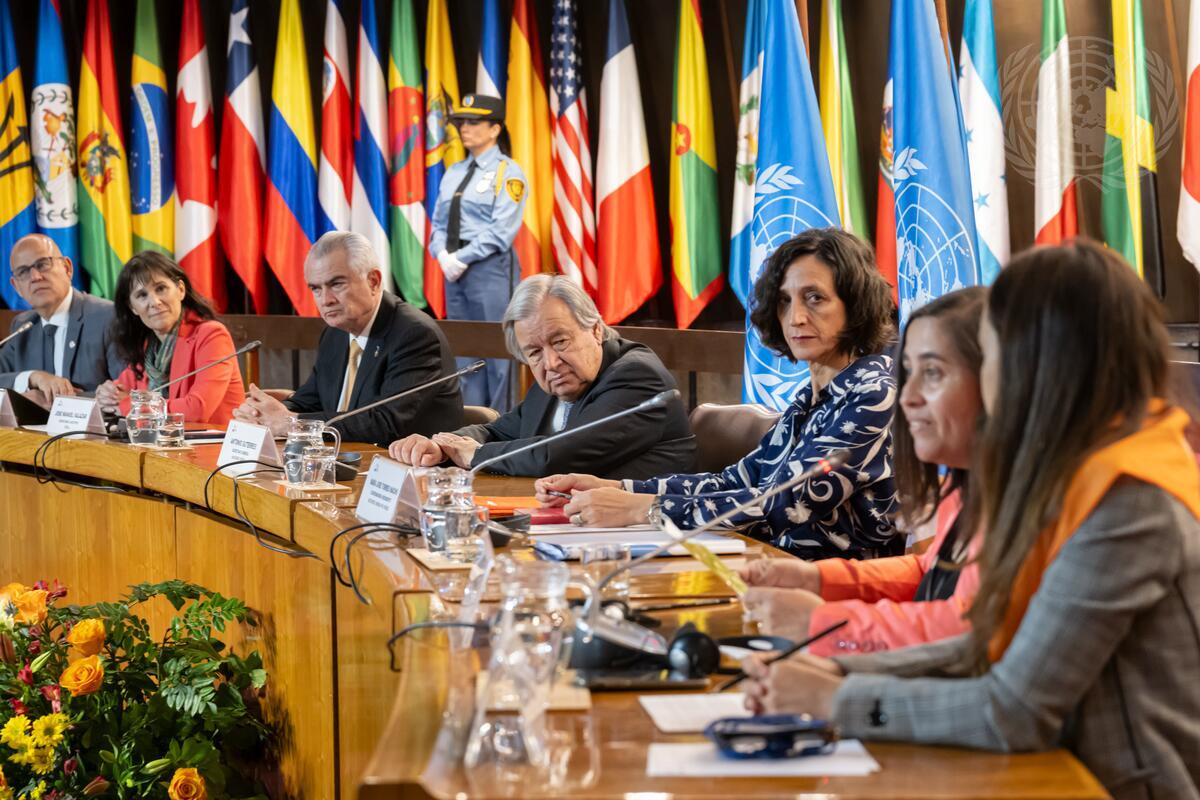
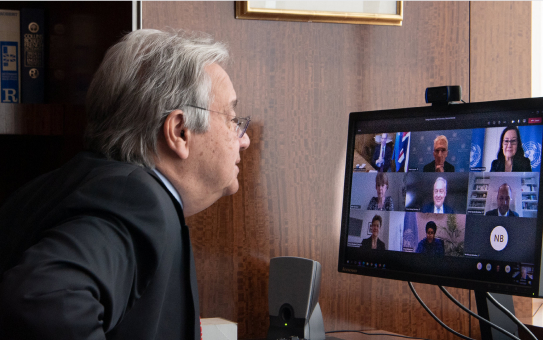 Eskinder Debebe/ United Nations
Eskinder Debebe/ United Nations
The role of the Secretary-General as an important peacemaking actor has evolved through extensive practice. The range of activities carried out by the Secretary-General has included good offices, mediation, facilitation, dialogue processes and even arbitration.
The Secretary-General may take action himself or may appoint special representatives and envoys to carry out good offices and mediation on his behalf. Numerous representatives of the Secretary-General also engage in peace talks or crisis diplomacy while overseeing UN political or peacekeeping missions in the field, which may have mandates to help nations and regions resolve conflicts and tensions peacefully.
Documents

This report has been prepared pursuant to General Assembly resolution 72/243, in which the Assembly called upon the Secretary-General to submit to it, at its seventy-fourth session, a report on the state of global peace and security in line with the central mandates contained in the Charter of the United Nations. The report highlights the evolving nature of armed conflict and violence and examines the seven major trends related to global peace and security today.
The present report recognizes mediation as an important tool for conflict prevention, management and resolution; analyses five elements of mediation support, providing examples of UN activities within the framework of each element; and sets out the means through which the entities of the UN system can coordinate their support for mediation initiatives at different levels.

The present report outlines progress made in implementing the General Assembly resolution 65/283 entitled “Strengthening the role of mediation in the peaceful settlement of disputes, conflict prevention and resolution”, in the context of key trends in the field of mediation. Also submitted as annexes to the present report are the Guidance for Effective Mediation and the views of Member States.
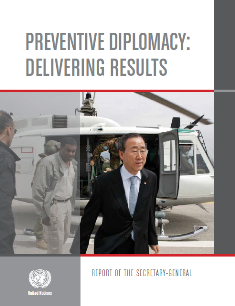
The present report examines the opportunities and the challenges the United Nations and its partners currently face in conducting preventive diplomacy in a changing political and security landscape.
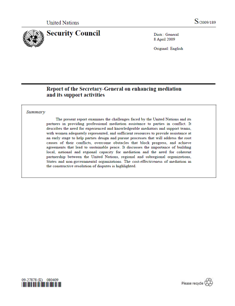
The present report examines the challenges faced by the United Nations and its partners in providing professional mediation assistance to parties in conflict. It describes the need for experienced and knowledgeable mediators and support teams, with women adequately represented, and sufficient resources to provide assistance at an early stage to help parties design and pursue processes that will address the root causes of their conflicts, overcome obstacles that block progress, and achieve agreements that lead to sustainable peace.

This report has been prepared pursuant to General Assembly resolution 72/243, in which the Assembly called upon the Secretary-General to submit to it, at its seventy-fourth session, a report on the state of global peace and security in line with the central mandates contained in the Charter of the United Nations. The report highlights the evolving nature of armed conflict and violence and examines the seven major trends related to global peace and security today.

On 23 March 2020, Secretary-General António Guterres issued an appeal for an immediate global ceasefire to help create conditions for the delivery of lifesaving aid, reinforce diplomatic action and bring hope to places that are among the most vulnerable to the COVID-19 pandemic. As of 23 June 2020, the Secretary-General's call had received support from 179 Member States and one non-member observer State, as well as a range of regional organizations and international and local civil society actors.
The present report recognizes mediation as an important tool for conflict prevention, management and resolution; analyses five elements of mediation support, providing examples of UN activities within the framework of each element; and sets out the means through which the entities of the UN system can coordinate their support for mediation initiatives at different levels.
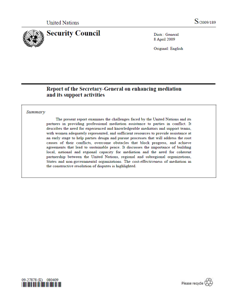
The present report was prepared pursuant to Security Council resolution 2171 (2014). The report considers the evolution of contemporary conflict and the prevention landscape in recent years; provides an overview of ongoing efforts to strengthen UN prevention tools and initiatives, highlighting the cooperation with regional and subregional organizations; and also considers key challenges and opportunities for conflict prevention.
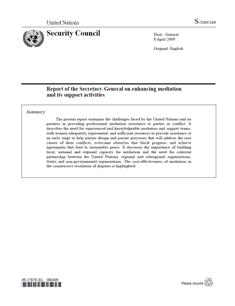
The present report describes efforts to strengthen cooperation and partnership between the United Nations and regional and subregional organizations to build mediation capacity and deepen strategic and operational partnerships in carrying out mediation efforts. It reviews trends in conflict and mediation and recalls the fundamentals of effective mediation as a background for cooperation efforts.
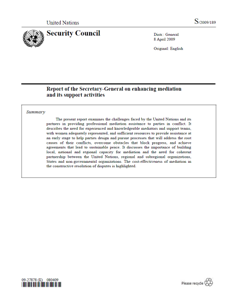
The present report outlines progress made in implementing the General Assembly resolution 65/283 entitled “Strengthening the role of mediation in the peaceful settlement of disputes, conflict prevention and resolution”, in the context of key trends in the field of mediation. Also submitted as annexes to the present report are the Guidance for Effective Mediation and the views of Member States.

The present report examines the challenges faced by the United Nations and its partners in providing professional mediation assistance to parties in conflict. It describes the need for experienced and knowledgeable mediators and support teams, with women adequately represented, and sufficient resources to provide assistance at an early stage to help parties design and pursue processes that will address the root causes of their conflicts, overcome obstacles that block progress, and achieve agreements that lead to sustainable peace.








